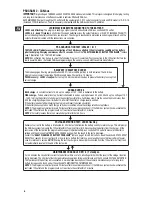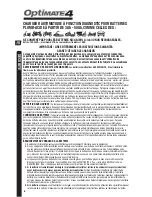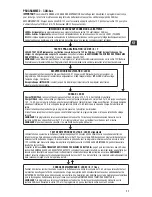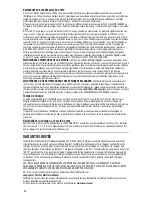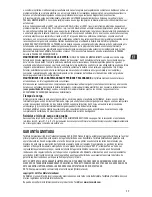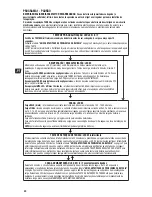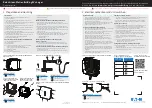
7
NOTES ON TEST RESULTS:
1.
For any test result other than green #5, disconnect the battery from the electrical system it supports, and reconnect the OptiMate.
If a better test result is now obtained, this suggests that the power losses are partly due to an electrical problem in the electrical
system and not in the battery itself. If the poor result persists, you are advised to take the battery to a professional service workshop
equipped with professional equipment for a more thorough investigation.
2.
During the maintenance charge cycle the TEST result will continue to be displayed until the TEST and MAINTENANCE cycle is
repeated. If the decline in voltage resulted from a current drain out of the battery which was only of a temporary nature, the LED
indication can revert to a better level.
3.
If the red LED #7 alone, or the yellow #6 and red LED #7 indicate together, a significant problem exists. The red / red LEDs
(or yellow LED alone for a sealed battery) mean that after being charged the battery’s voltage is not being sustained or that despite
recovery attempts the battery was irrecoverable. This may be due to a defect in the battery itself, such as a short-circuited cell or
total sulphation, or, in the case of a battery still connected to the electrical system it supports, the red LED #7 may be signalling a
loss of current through deteriorated wiring or a degraded switch or contact, or in-circuit current-consuming accessories. A sudden
load such as vehicle headlights being switched on while the charger is connected can also cause the battery voltage to dip
significantly.
4.
GOOD TEST RESULT, but the battery cannot deliver sufficient power: Permanent damage within the battery may be causing
excessive self discharge (caused by the battery itself, even a partly damaged battery may initially retain sufficient power, but lose
power faster than normal there-after). Disconnect the battery from the OptiMate. After at least 12 hours reconnect and observe the
TEST result during the PRE-QUALIFICATION TEST.
AUTOMATIC BATTERY MAINTENANCE:
The MAINTENANCE CHARGE CYCLE consists of 30 minute float charge periods
followed by and alternating with a 30 minute ‘rest’ periods, during which there is no charge current. This “50% duty cycle” prevents
loss of electrolyte in sealed batteries and minimizes gradual loss of water from the electrolyte in batteries with filler caps, and
thereby contributes significantly to optimizing the service life of irregularly or seasonally used batteries. The circuit offers current to
the battery within a safe 13,6V voltage limit (“float charge”), allowing it to draw whatever small current is necessary to sustain it at
(or close to) full charge and compensate for any small electrical loads imposed by vehicle accessories or on-board computer, or the
natural gradual self-discharge of the battery itself.
Maintaining a battery for extended periods:
The OptiMate will maintain a battery whos basic condition is good, for months
at a time. At least once every two weeks, check that the connections between the charger and battery are secure, and, in the case of
batteries with filler caps on each cell, disconnect the battery from the charger, check the level of the electrolyte and if necessary, top
up the cells
(with distilled water, NOT acid)
, then reconnect. When handling batteries or in their vicinity, always take care to
observe the SAFETY WARNINGS above.
Charging time
The minimum time required for the OptiMate 4 to complete a charge and test cycle and provide a result, even on a fully charged
battery, is 45 minutes. Charge time on a flat but otherwise undamaged battery is roughly equal to the battery’s Ah rating, so a 20Ah
battery should take no more than about 20 hours to progress to the self-discharge check (§ 5). Deep-discharged batteries may take
significantly longer.
If using the OptiMate 4 on a severely discharged automobile battery of larger capacity, a full charge may not be achieved within the
48 hour charge safety limit. In this case follow the reset procedure below.
Resetting the charge or test cycle
Disconnect from the AC mains. Wait for the POWER ON LED #1 to go out. Upon reconnection to AC power all LEDs except #1,2, 8, 9
and 10 will flash twice to confirm micro processor health, irrespective if the charger remains connected to a battery or not.
LIMITED WARRANTY
TecMate (International) SA, Sint-Truidensesteenweg 252, B-3300 Tienen, Belgium, makes this limited warranty to the original
purchaser at retail of this product. This limited warranty is not transferable. TecMate (International) warrants this battery
charger for three years from date of purchase at retail against defective material or workmanship. If such should occur the unit
will be repaired or replaced at the option of the manufacturer. It is the obligation of the purchaser to forward the unit together
with proof of purchase (see NOTE), transportation or mailing costs prepaid, to the manufacturer or its authorized representative.
This limited warranty is void if the product is misused, subjected to careless handling, or repaired by anyone other than the
factory or its authorized representative. The manufacturer makes no warranty other than this limited warranty and expressly
excludes any implied warranty including any warranty for consequential damages.
THIS IS THE ONLY EXPRESS LIMITED WARRANTY AND THE MANUFACTURER NEITHER ASSUMES NOR AUTHORIZES ANYONE TO
ASSUME OR MAKE ANY OTHER OBLIGATION TOWARDS THE PRODUCT OTHER THAN THIS EXPRESS LIMITED WARRANTY. YOUR
STATUTORY RIGHTS ARE NOT AFFECTED.
NOTE: Details at www.tecmate.com/warranty.
copyright © 2013 TecMate International
OptiMate 4 and the names of other battery care products mentioned in these instructions such as BatteryMate, TestMate and
TestMate mini, are registered trademarks of TecMate International NV.
WARRANTY in Canada, USA, Central America and South America:
TecMate North America, Oakville, ON, Canada, as a wholy owned subsidiary of TecMate International, assumes the
responsibility for product warranty in these regions.
More information on TecMate products can be found at
www.tecmate.com
.
TM240-IN1-130322_113%.indd 7
13-03-21 4:58 PM






